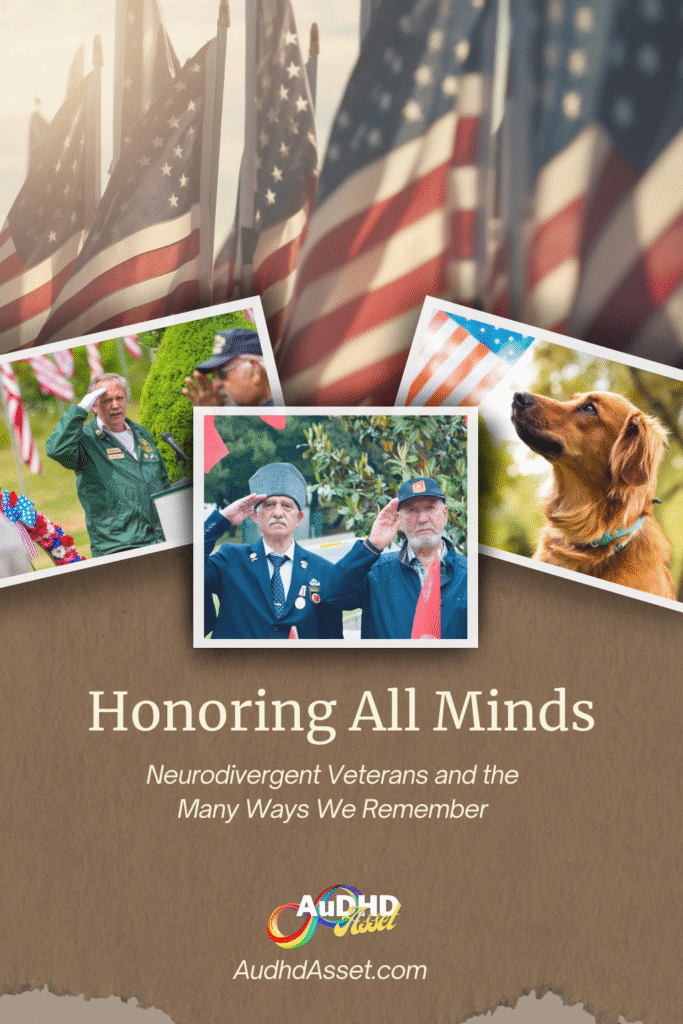As Memorial Day arrives, we take time to honor and remember those who gave their lives in service to our country. It’s a solemn moment of reflection — a collective pause to recognize the courage, dedication, and ultimate sacrifice made by so many.
Among those we remember are service members whose minds worked differently — those who were neurodivergent. Neurodivergence includes a range of cognitive differences such as autism, ADHD, dyslexia, and PTSD. These differences shaped their experiences in unique ways, both during their time in uniform and beyond.
This post is an invitation to broaden our lens of remembrance. By honoring all who served — including those whose experiences and struggles may have gone unseen — we enrich our understanding of service and create a more inclusive space for memory, grief, and gratitude.
A Brief History of Neurodivergent Individuals Who Have Served
Neurodivergent individuals have always been part of military history — even if their differences weren’t always named, understood, or accepted. For centuries, people whose minds worked outside the norm have stepped into roles of leadership, strategy, innovation, and frontline service.
In past generations, many neurodivergent traits were overlooked, mislabeled, or even praised under different terms. A soldier who was intensely focused and resistant to distraction may have been described as “disciplined” rather than autistic. A creative problem-solver with restless energy might have had undiagnosed ADHD, seen instead as “high-spirited” or “driven.” PTSD, once called “shell shock” or “combat fatigue,” represents one of the most widely recognized neurodivergent experiences among veterans — a reminder that the brain’s response to trauma is real and enduring.
Throughout modern conflicts, from World Wars to recent overseas missions, countless neurodivergent individuals have served with distinction. While the military has historically emphasized conformity and hierarchy, many service members succeeded because of their neurodivergent traits — not in spite of them. Their unique perspectives allowed them to excel in fields like intelligence, communications, logistics, and technology.
Despite their contributions, neurodivergent veterans have often faced barriers to recognition and support. Misunderstood behaviors, lack of accommodations, and stigma around mental health and disability have kept many in the shadows. But today, with greater awareness and evolving definitions of neurodiversity, we have the opportunity to revisit these histories and ensure these individuals are seen, heard, and honored.
Stigma and Silence: How Many Neurodivergent Veterans Have Gone Unseen or Unsupported
Despite their service and sacrifice, many neurodivergent veterans have lived in the shadows — misunderstood, misdiagnosed, or completely overlooked. The culture of silence around neurodivergence in the military has long contributed to a lack of recognition and support, both during active duty and after returning to civilian life.
For generations, service members who experienced cognitive or emotional challenges were expected to “tough it out” rather than seek help. Struggles with sensory processing, attention regulation, communication, or emotional overwhelm were often dismissed as weakness or poor discipline. PTSD, in particular, has historically been met with stigma, leaving many veterans isolated and reluctant to speak about their experiences.
Those with traits associated with autism or ADHD were often labeled as “difficult,” “noncompliant,” or “unfit,” even when they performed exceptionally in certain areas. Others masked their differences entirely, fearing discharge or discrimination. The cost of this silence has been high — leading to missed diagnoses, lack of accommodations, and limited access to resources that could have supported healing and long-term well-being.
Even within veteran support systems today, neurodivergence is frequently misunderstood. Many resources focus on physical injuries or narrowly defined mental health concerns, leaving those with non-visible disabilities to navigate a complex and often inaccessible system on their own.
Breaking this silence means validating a truth that many veterans have known all along: that neurodivergent minds have always served, and they deserve to be seen, supported, and remembered with the same honor as anyone else.
Honoring Neurodivergent Veterans
The Importance of Visibility and Inclusion in Remembrance
To truly honor all who have served, we must ensure that neurodivergent veterans are not only remembered but recognized for the full scope of their contributions and experiences. Visibility matters — because when we see neurodivergent veterans clearly, we begin to dismantle the outdated belief that only certain kinds of minds are fit for service or worthy of honor. Inclusion in our stories, ceremonies, and support systems affirms that every kind of service counts, and that different ways of thinking are not deficits, but strengths.
Mental Health and Post-Service Challenges Unique to Neurodivergent Vets
Transitioning from military to civilian life is difficult for many veterans — but neurodivergent individuals often face additional hurdles:
- Sensory sensitivities can make crowded VA clinics, job fairs, or support events overwhelming.
- Executive dysfunction may hinder tasks like scheduling appointments, managing paperwork, or navigating benefits.
- Communication differences can lead to misunderstandings with providers or support personnel.
- Stigma — especially for those whose neurodivergence was never formally diagnosed during service — can cause veterans to minimize their struggles or avoid seeking help altogether.
Moreover, many systems still operate on a one-size-fits-all model that doesn’t accommodate neurodiverse needs. When care is rigid or inaccessible, neurodivergent veterans are more likely to fall through the cracks — not because of a lack of resilience, but because the system wasn’t built with their realities in mind.
Honoring neurodivergent veterans means more than gratitude — it means building pathways of understanding, accessibility, and support that reflect the full diversity of those who have served.
Rethinking Remembrance
As our understanding of service expands, so too should the ways we remember. Traditional forms of remembrance — parades, large ceremonies, and symbolic gestures — are powerful, but they often reflect a narrow view of who veterans are and how they want to be honored. For neurodivergent veterans, these traditional practices may feel overwhelming, isolating, or even inaccessible.
Moving toward More Inclusive Approaches
Honoring all minds requires reimagining remembrance in ways that reflect the diversity of experiences among those who’ve served. It means creating space not just for public celebration, but for quiet reflection, community care, and authentic storytelling.
Here are a few ways we can make remembrance more inclusive:

Story-Sharing Projects
Encourage veterans to share their stories in their own words — through writing, interviews, visual art, or multimedia. Platforms that highlight neurodivergent experiences help normalize the idea that service looks different for everyone, and that every story is worthy of being heard. Anonymous or guided formats can provide safer spaces for those who are not ready to go public.
Community Support Events with Neurodivergent Access
Design veteran events that include accommodations for sensory sensitivities, communication differences, and social processing needs. This could mean offering:
- Clearly labeled quiet zones
- Visual schedules or event guides
- Trained support staff or peer navigators
- Multiple formats for engagement (in-person and virtual)
When events are accessible by design, more veterans feel welcomed and valued.
Advocacy for Neurodivergent Services in Veteran Care Systems
Remembrance isn’t just about the past — it’s also about how we show up for living veterans. Advocate for better screening, recognition, and services for neurodivergent individuals within the VA and other veteran-focused institutions. This includes mental health care tailored to autistic adults, ADHD coaching, trauma-informed therapy, and peer support groups that reflect neurodiverse experiences.
Quiet, Sensory-Friendly Memorial Opportunities
Not every form of remembrance needs to be loud or public. Sensory-friendly spaces — like nature walks, candlelight vigils, or small-group gatherings — can offer meaningful alternatives. These moments of stillness and reflection can be especially powerful for those who feel disconnected from traditional memorial events.
Honoring neurodivergent veterans begins with awareness — but it doesn’t end there. Real remembrance means action. Whether you’re a veteran, a family member, a community leader, or simply someone who wants to do better, here are ways you can help lift up and support neurodivergent voices:
Listen and Learn
- Seek out first-person accounts from neurodivergent veterans.
- Challenge assumptions about what service and sacrifice “should” look like.
- Follow neurodivergent advocates and veteran support organizations on social media.
Education is an ongoing process — and listening is one of the most powerful ways to show respect.
 Share and Support Resources
Share and Support Resources
Here are a few resources that provide support or advocacy for neurodivergent veterans:
- Autistic Veterans of America (advocacy and peer connection)
- ADHD Veterans Support Network (online support and education)
- The VA’s Office of Mental Health & Suicide Prevention (with expanding initiatives around neurodiverse care)
- Neurodiversity in the Armed Forces (UK-based, but insightful for global awareness)
Supporting these initiatives — financially or through word-of-mouth — helps push the conversation forward.
Take Community and Organizational Action
- Encourage local veteran events to offer sensory-friendly or neurodiversity-informed options.
- Volunteer with or donate to veteran programs that include disability and neurodivergence in their mission.
- Advocate for inclusive policies in workplaces, schools, and public events that support neurodivergent veterans in their post-service lives.
Small changes, like using inclusive language or providing multiple ways for people to engage, can make a huge difference in how seen and supported someone feels.
On Memorial Day, we remember the fallen. And in that act of remembrance, we also honor those whose stories are still unfolding — the living veterans carrying invisible wounds, quiet strengths, and minds that process the world a little differently.
To honor all minds is to deepen the way we remember. It means embracing complexity, expanding our compassion, and choosing inclusion over tradition for tradition’s sake. Neurodivergent veterans have always been part of our history — it’s time they take their place in how we remember, how we serve, and how we move forward together.



